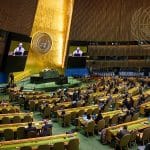George Tsunis, President Joe Biden’s nominee as next ambassador to Greece, survived his January 12 hearing with the Democratic-majority Senate Foreign Relations Committee (SFRC), paving the way for a confirmation by the full Senate.
SFRC Hearings are intended to screen nominees for sufficient qualifications to manage a delicate ambassadorial posting. The Tsunis case is unusual because it is an exceedingly rare “do-over” for a political appointee who withdrew from a previous nomination, that of US Ambassador to Norway under then-President Obama, after a disastrous 2014 confirmation hearing that revealed a deep lack of preparation for the position. Tsunis’ performance at that time earned him the moniker “punchline” and much of that fiasco was again front and center on January 12 since several major publications highlighted his hearing as a major test for a Biden nominee in a tense period when the US Senate was dealing with numerous critical and highly partisan domestic issues.
However, the polite handling of the January 12 hearing makes it appear as if the controversy surrounding the nomination of a major campaign donor to the sensitive diplomatic posting in Athens has faded somewhat. While grumbling from the Washington foreign affairs community continues, there is general acceptance that the President retains the constitutional authority to hand out ambassadorial postings as he sees fit. And yes, some in Washington are still categorizing these kinds of assignments as “sinecures.”
A mature and important American ethnic community
The Greek-American community is elated of course, as Biden’s nomination of Tsunis signals that it is being treated at a political level as are most other large, mature, and influential US ethnic communities with important “ethnic” ambassadorial nominees in many cases. This is the essence of American politics; the Tsunis situation remains unusual because of his unique “do-over” status and the large campaign donations he has bundled for the Democratic Party or made personally. Knowledgeable Greeks remain unconvinced however that this nomination signals anything positive about the potential for moving Greek-American relations to a higher level.

The actual hearing appears to have been skillfully stage-managed by SFRC Chair Robert “Bob” Menendez, Tsunis’ most powerful supporter after the president himself. Tsunis took the opportunity to thank the US for the tremendous opportunities it had given him and especially his immigrant family. A significant amount of the question-and-answer session (with questions from both parties) focused on Tsunis’ ideas about containing China’s growing influence in Greece after Beijing’s state-owned COSCO took the majority share in the Piraeus Port Authority. If anything, these were “softball” questions most senators would agree need to be addressed at a bipartisan level and negative comments about Tsunis’ lack of diplomatic experience were not expressed.
What’s next for US trade and investment?
There is considerable concern in Athens that much of the progress achieved on the bilateral trade and investment front since Prime Minister Kyriakos Mitsotakis took office in mid-2019 will slowly begin to evaporate. It will be difficult for any incoming ambassador to surpass the arduous work put in by departing American Ambassador Geoffrey Pyatt, a career Foreign Service Officer, on bilateral economic issues and energy, but especially in utilizing various media outlets to improve Greece’s image in the US as an investment destination.
Although Tsunis proclaimed intent in his prepared statement to focus heavily on economic and commercial matters, something many nominees do, what the Greeks are looking for now is additional significant investment by major American companies, not a flood of New York-based Greek-American developers and “venture capitalists” focusing on tourism, all of whom will proclaim their deep connection to Tsunis, starting from the day he is sworn in if not before. That is understood in Athens as a step backwards to earlier times.
The irony here is that the reforms the Mitsotakis government launched a few years back are beginning to translate into an improved investment climate which automatically generates higher investor interest; this progress need not pass through any US ambassador’s office. Investors should not need ambassadorial support to fix a meeting with a senior Greek minister and less of those kinds of machinations are currently needed in today’s gradually modernizing Greek business environment.
Finally, new investments also require a sense of geopolitical stability. All it takes is a single “hot” Greek-Turkish incident on the border or in the Aegean to undermine much of the security investors are beginning to take for granted. Ultimately this is where the crisis-management skills of the resident US ambassador can make an enormous difference, and if certain “red lines” are crossed, there is simply no comparison between the polished skill sets of a career diplomat and those of a political appointee.








